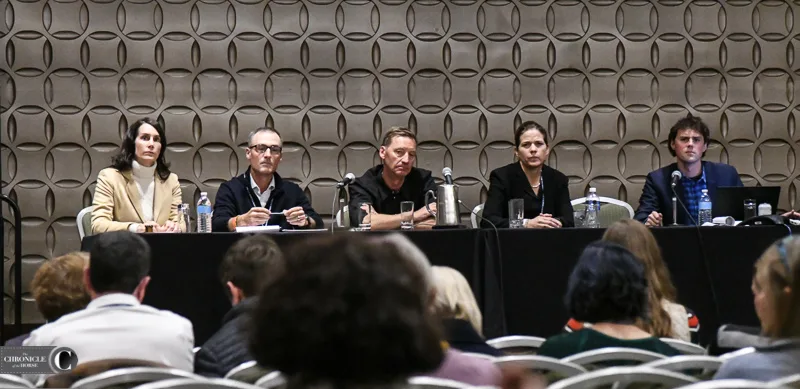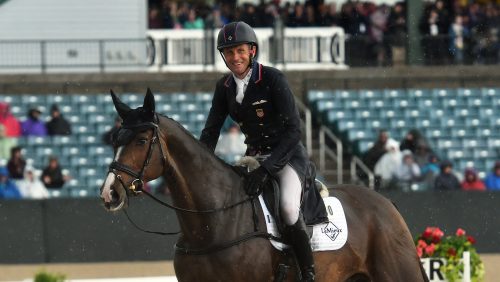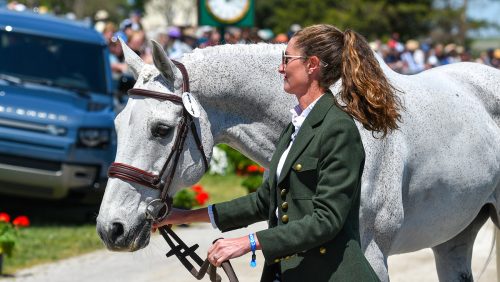Boston—Dec. 15
It’s been 16 years since U.S. Eventing Association members last met in Boston for their annual meeting and convention, and that meeting in 2003 was the best attended in the organization’s history.
Area I was the birthplace of eventing in the United States, so it was fitting that the association board chose to return to Boston for a 60th anniversary celebration.
Headlined by a panel discussion on the past, present and future of eventing and the introduction of new president, and Massachusetts native, Max Corcoran, this year’s annual meeting had the highest number of pre-registrants ever and welcomed 530 members, the third largest convention ever.
Outgoing president Carol Kozlowski, a lifelong resident of Area I, spoke to members at the annual meeting luncheon on Saturday, noting her focus on safety has been one of her proudest achievements during her three-year term.
“I’d like to think my Yankee roots have been character-building,” she said. “I think that we New Englanders are resilient, and we’re resourceful. The rest of you are likely to think we’re just crabby because our eventing season is really short! But remember, we’re not just the home to the place where the Pilgrims landed, but also the birthplace of the sport in this country. The USCTA was born here in Boston 60 years ago, and like the Pilgrims, the early eventers were tough, and we like to think we carry on that tradition of hardiness and determination here in Area I. Some of us defect to southern climates for a bit in the winter when the going gets a little rough, but please don’t assume that makes us any less fond of our roots!”
Kozlowski began her work with USEA in 2007 as vice president of the Safety Committee.

The USEA Convention was headlined by a panel discussion with Woodge Fulton, Max Corcoran and Jimmy Wofford on the past, present and future of eventing.
“I feel as if we’ve made so many positive and measurable moves in the right direction, keeping our riders and our horses safer and protecting the integrity of our sport,” she said. “With all vested parties as stakeholders, the riders, the owners, the organizers, the volunteers, the course designers and the officials, we collaboratively move forward with each individual accepting their share of the responsibility for making the best decisions possible. As we are human and we are partnered with animals, it is inevitable that mistakes will be made, and the knowledge gained from those mistakes empowers us to constantly improve. Our best efforts combine to produce a sport that will continue to adapt and to thrive. Everyone here in this room is present because of their fervent belief that we do something very special with our equine partners. We all want to be a part of its legacy into the future.”
Corcoran was a longtime groom for Karen O’Connor and has continued as a freelance groom as well as organizing events. She’s served on the USEA board of governors and is planning to focus on horsemanship and horse welfare as part of her presidency.
“I went to Northeastern University, which is two subway stops from here, and I spent five years of my life commuting into Boston before I decided I couldn’t do that anymore and went back to work with the horses,” she said. “This is such an awesome city, and it’s so great to be back here. When they first asked me to take on this presidency, I asked David O’Connor, who said I’d be fine! I was thinking about it, and when they said I’d be taking over in Boston I thought, ‘Oh, that probably is supposed to be what I’m supposed to do.’ ”
ADVERTISEMENT
Here are some key topics of conversation and tidbits from the convention:
• If passed by the U.S. Equestrian Federation at its mid-year meeting next year, EV113 would only require medical armbands or bracelets for riders that have specific medical needs where such information would be useful.
• Currently, if a rider activates a frangible pin at a national competition they do not receive any penalties. The USEF will likely adopt an FEI rule that awards 11 penalties for activating a frangible device. Since the FEI has changed the rule in recent years, USEF officials wanted to wait, and it has not yet been put forward to the USEF Rules Working group or the Eventing Sport Committee. The USEF will not implement the newly revised FEI rule regarding knocking a flag since it’s still controversial.
• This year’s USEA Volunteer Of The Year award was presented to Diane Bird of Virginia, who logged in 307 hours of volunteer time. Her husband Art Bird logged 214 hours to finish sixth on the leaderboard.
• Boyd Martin won the World Equestrian Brands USEA Rider Of The Year award for the second consecutive year with a total of 841.5 points.
• Andrea Baxter won the biggest check of the night, the $50,000 Rebecca Broussard International Developing Rider Grant.
• There was a small increase in starters this year, most of which came from the beginner novice through training levels. Total starts were 41,215.
• Membership is staying steady with 12,678 registered members.

Dr. Susan Johns, Matt Brown, Erik Duvander, Max Corcoran and Sam Watson led a panel discussing why U.S. event horses aren’t lasting longer at the top levels.
• The USEA continues to operate with no debt, despite a difficult financial year in 2018 due to event cancellations because of weather.
• The American Eventing Championships, held at the Kentucky Horse Park, had the largest number of starters in U.S. eventing history at 924 across 23 divisions. A record 53 teams started the Adult Team Challenge.
ADVERTISEMENT
The USEA announced that in addition to hosting the 2020 AEC, the Kentucky Horse Park will also host the 2021 edition. The Board of Governors voted to begin negotiations with Rebecca Farm (Montana) for the 2022 edition.
• A final preparation event for the U.S. Eventing Team before the Tokyo Olympics has not been chosen yet, but the team will prepare to ship to the Games at the U.S. Equestrian Team headquarters in Gladstone, New Jersey, on July 15. The flight will be 16 hours and includes a fuel stop in Anchorage, Alaska. Eventing at the Olympics will be held July 31-Aug. 3.
• USEF High Performance Director Erik Duvander spoke about the 2020 strategic plan and its mission “to create a competitive learning environment where U.S. athletes and horses can develop their skills to succeed at championships.” Duvander spent 260 days on the road in 2019 and attended 26 events and five team events.
The performance advisory team, which was put together last year, will continue to review, challenge and advise the high performance program. Members include Karen O’Connor, Ian Stark, Derek di Grazia, Bobby Costello, Leslie Law and Duvander.

Liz Halliday-Sharp (left) was one of the biggest winners of the Saturday night awards dinner, taking home the $25,000 Connaught grant for Cooley Moonshine.
• While there were no horse deaths at USEA-recognized events in 2019, membership mourned the loss of three riders due to schooling accidents and one in a fall in the warm-up of a recognized competition. As a result, the Safety Committee is looking at rule changes regarding warm-up fences, which could include placement and decoration. The Cross-Country Safety Subcommittee is looking into a rule that would prohibit a competitor from proceeding to cross-country after a show jumping round that included five or more rails at events that hold that phase before cross-country.
• Most riders are not utilizing their ERQI rating, provided by data company Equiratings, that gives a red, yellow or green rating as a guideline for measuring competency at a certain level. During their August meeting, the USEA board of governors voted to supply a list of horses entered in each competition who hold a red or yellow ERQI rating to licensed officials in advance as a tool to monitor horse welfare and safety of riders, much like a watch list.
• A small increase in the starter fee was approved. It will go from $21 per entry to $25.
Want a comprehensive report on everything that happened at the 2019 USEA Convention? Look for the full story in the Jan. 13 issue of The Chronicle of The Horse. We’ll have a full list of special award winners, a wrap-up of panel discussions, rule changes you need to know, and an exclusive interview with new president Max Corcoran.
















